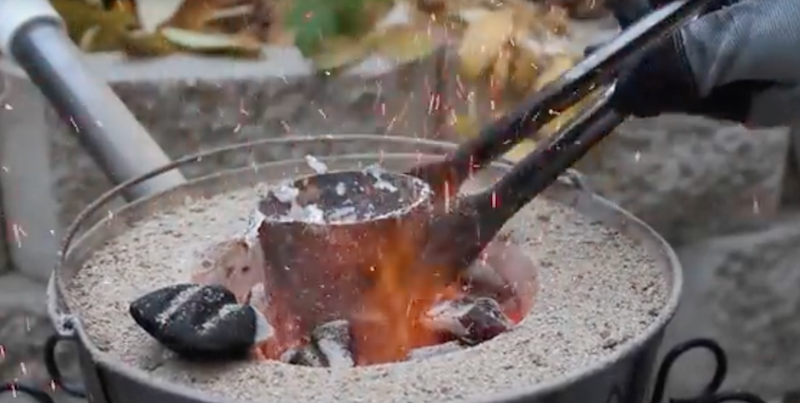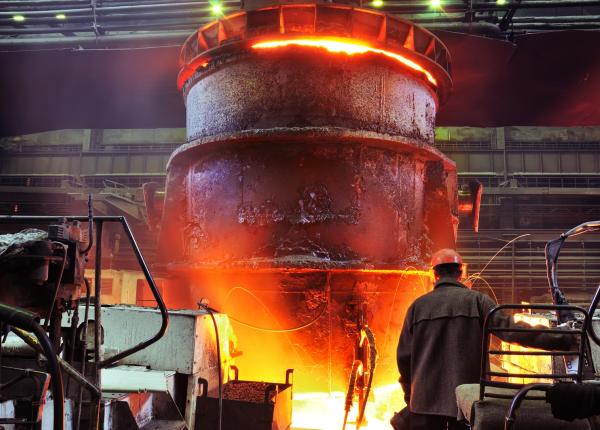Analyzing Metal Casting Applications Across Engineering Fields
Wiki Article
A Comprehensive Overview to Metal Casting: Advantages and Providers Provided by Foundries
Metal casting is an important process in numerous industries, providing numerous advantages through the services of shops. These centers transform liquified metal into precise and sturdy components, dealing with specific client needs. By using innovative innovations, shops assure quality and effectiveness in production. Nevertheless, the details of metal casting and the varied techniques entailed increase essential inquiries regarding its role in modern-day production. What developments lie ahead in this necessary area?Understanding the Metal Casting Process
The metal casting procedure is an essential method utilized in manufacturing to develop complex shapes and components. This technique includes putting liquified metal right into a mold and mildew developed to form the wanted things. The process starts with pattern creation, which acts as a theme for the mold and mildew. Aluminum Foundry. Different products, such as sand, metal, or ceramic, are made use of for mold-making, relying on the details needs of the casting
Once the mold is ready, liquified metal is put into it and allowed to cool and solidify. After solidification, the mold and mildew is gotten rid of, revealing the cast part. Various methods, including sand casting, investment casting, and pass away casting, are employed, each suited to various applications and products. Quality control steps, such as examinations and screening, are vital to assure the end product satisfies specs. In general, the metal casting process plays an essential role in generating parts for industries ranging from vehicle to aerospace.
Trick Benefits of Metal Casting
Metal casting offers significant advantages that make it a favored manufacturing approach in different industries. Its style versatility and precision permit for detailed forms, while affordable mass manufacturing improves effectiveness. Furthermore, the versatility and strength of products used in casting contribute to the sturdiness of the end products.Style Flexibility and Precision
Releasing remarkable design adaptability and accuracy, metal casting permits developers and designers to produce detailed forms and attributes that would be difficult or tough to attain with other producing methods. This ability allows the manufacturing of complicated geometries, inner structures, and fine details that improve product capability and visual appeals. Furthermore, numerous casting techniques, such as sand casting, financial investment casting, and pass away casting, give additional choices for modification, suiting diverse product buildings and job requirements. The versatility of molds allows modifications throughout the design phase, simplifying the change from idea to final item. Ultimately, metal casting stands apart for its ability to supply high-precision components, making it a very useful procedure in industries ranging from automobile to aerospace and beyond.Economical Mass Manufacturing
Cost-efficient mass manufacturing stands as one of the primary benefits of metal casting, enabling producers to produce huge amounts of elements at a reduced price per device. This efficiency emerges from the capacity to produce detailed molds that can be reused several times, substantially lowering configuration and operational expenses. Furthermore, metal casting procedures, such as sand casting and die casting, enable high throughput, making it viable to meet the demands of large manufacturing runs. The lowered product waste and power usage additionally enhance cost savings, making metal casting an appealing alternative for industries requiring mass parts. In general, the economical nature of metal casting positions it as a favored approach for suppliers intending for financial efficiency in their manufacturing procedures.Product Convenience and Stamina
Among the standout qualities of metal casting is its remarkable product versatility, which permits using a wide variety of alloys and metals. This flexibility makes it possible for manufacturers to select materials that best suit their details applications, from light weight aluminum and bronze to iron and steel. Each metal uses one-of-a-kind buildings, including varying levels of toughness, corrosion resistance, and thermal conductivity. Metal casting can create elements that meet strict efficiency needs throughout diverse sectors, such as auto, aerospace, and building and construction. Furthermore, the strength of actors steels can be enhanced with numerous treatment processes, ensuring toughness and longevity. Metal Casting. In general, the mix of material convenience and intrinsic strength makes metal casting a recommended option for generating top quality elementsKinds Of Metal Casting Techniques
Metal casting encompasses a selection of techniques that provide to various manufacturing needs and product buildings. Usual approaches consist of sand casting, which uses a sand mold and mildew for complex forms, and financial investment casting, understood for its precision and surface coating. Pass away casting is one more strategy that uses high-pressure injection of molten metal right into molds, ideal for automation of little parts.Covering molding provides a faster different, making use of a resin-coated sand to create thin-walled mold and mildews, while lost foam casting allows for detailed styles without the need for a core.
In addition, constant casting is utilized for creating long areas of metal, such as bars or sheets, by strengthening molten metal in a continual process. Each strategy is and provides special advantages picked based on aspects like the required information, manufacturing volume, and product type, ensuring premium results in metal manufacture across different sectors.
The Function of Foundries in Metal Casting
Shops play an essential duty in the metal casting procedure, acting as the facilities where liquified metal is changed right into finished products. These specialized facilities are equipped with the necessary devices and technologies to deal with numerous steels, guaranteeing high-quality results. Shops are accountable for numerous important functions, including thawing the metal, pouring it into mold and mildews, and permitting it to solidify.Furthermore, they keep rigorous safety and ecological criteria to protect workers and reduce environmental effect. Skilled specialists and Home Page engineers work together to enhance casting procedures, boosting performance and lowering waste. Shops additionally take part in quality assurance actions, ensuring that the final products satisfy details resistances and specs. This high quality assurance is vital for markets that count on accurate elements, such as automobile and aerospace. As a result, foundries add significantly to the general manufacturing landscape, allowing development and growth throughout numerous markets.
Personalized Metal Casting Providers
Personalized metal casting solutions provide tailored style options that satisfy particular client requirements. These solutions also offer product selection competence, guaranteeing the ideal metal is picked for the preferred application. Such versatility and understanding boost the total top quality and performance of the final item.
Customized Design Solutions
Customized design solutions in metal casting offer suppliers with the adaptability to create components that satisfy certain efficiency and visual requirements. Foundries use tailored solutions that permit clients to specify Metal Casting dimensions, shapes, and surface finishes to achieve preferred results. This customization process commonly consists of cooperation in between developers and designers, ensuring that the end products straighten with functional demands and sector criteria. Advanced modern technologies, such as computer-aided layout (CAD) and simulation software, enable precise modeling and screening of parts prior to production, improving and reducing errors efficiency. By leveraging tailored layout options, services can enhance functionality while reducing waste and costs, ultimately bring about an extra one-upmanship in the market. This adaptability is essential for industries requiring unique applications and specifications.Product Option Expertise
When picking products for metal casting, competence plays a vital role in making certain that the ideal option aligns with both efficiency demands and cost-effectiveness. Foundries use proficient experts who recognize the residential or commercial properties of various metals and alloys, allowing them to advise suitable materials for specific applications. Variables such as stamina, corrosion resistance, and thermal conductivity are carefully taken into consideration to meet the customer's needs. In addition, industry fads and developments in material scientific research inform these choices, enabling factories to stay affordable. By leveraging their knowledge, shops can assist customers in steering with facility material alternatives, ultimately causing boosted product high quality and reduced production prices. This customized knowledge is crucial for attaining successful results in customized metal casting solutions.High Quality Control in Metal Casting
Quality control in metal casting is vital to assure that the final products satisfy the needed requirements and performance standards. Foundries utilize a range of strategies and methodologies to assure the best of cast elements. This process starts with rigid product examinations, confirming that resources follow industry requirements. Throughout the casting procedure, real-time surveillance and screening are conducted to evaluate specifications such as temperature level, mold and mildew honesty, and dimensional accuracy.
Applications of Metal Castings Across Industries
Metal spreadings play an essential function in various industries, serving as the foundation for numerous applications. In the vehicle sector, cast components such as engine blocks and transmission housings are needed for lorry performance and reliability. The aerospace market depends on accuracy spreadings for essential parts that guarantee safety and efficiency in flight. Furthermore, the building market utilizes metal spreadings for components, installations, and architectural aspects, enhancing the longevity of structures and framework.In addition, the power field take advantage of spreadings made use of in generator blades and various other devices necessary for power generation - Metal Foundry. The medical field also uses metal spreadings in tools and tools, demonstrating the flexibility of this manufacturing procedure. Generally, metal spreadings are important to the performance and development of diverse fields, showcasing their value in contemporary technology and framework advancement
Frequently Asked Inquiries
What Materials Are Typically Made Use Of in Metal Casting?
Typical materials made use of in metal casting include aluminum, iron, steel, bronze, and brass. Each product provides unique homes ideal for various applications, enabling manufacturers to choose the very best choice based upon stamina, weight, and deterioration resistance.Just how Long Does the Metal Casting Refine Usually Take?
The metal casting procedure usually takes numerous hours to a few days, depending upon variables such as the complexity of the style, kind of metal used, and the specific casting approach employed by the foundry.
What Is the Ecological Influence of Metal Casting?
The environmental impact of metal casting includes power intake, emissions, and waste generation. Factories commonly implement steps to reduce these results, such as reusing products and utilizing cleaner modern technologies to reduce their ecological footprint.Can Metal Casting Be Done for Small-Scale Projects?
Metal casting can undoubtedly be executed for small projects. Various foundries satisfy such demands, supplying tailored solutions that accommodate limited production runs while maintaining quality and precision in the end products.What Are the Safety Measures in Metal Casting Foundries?
In metal casting foundries, precaution include individual safety equipment, appropriate air flow, training on equipment usage, emergency situation treatments, routine upkeep checks, and adherence to market security criteria to minimize threats related to liquified metal and harmful materials.Additionally, metal casting processes, such as sand casting and pass away casting, permit for high throughput, making it practical to satisfy the demands of large manufacturing runs. One of the standout attributes of metal casting is its exceptional product flexibility, which permits for the use of a vast range of alloys and steels. Additionally, constant casting is used for creating lengthy areas of metal, such as sheets or bars, by strengthening liquified metal in a continual procedure. Shops play a critical role in the metal casting procedure, serving as the centers where molten metal is transformed right into finished items. Typical products utilized in metal address casting include light weight aluminum, iron, brass, steel, and bronze.
Report this wiki page